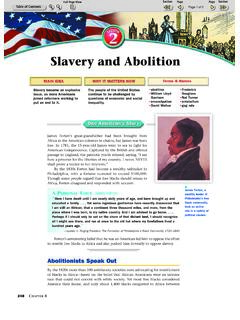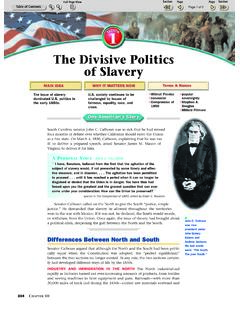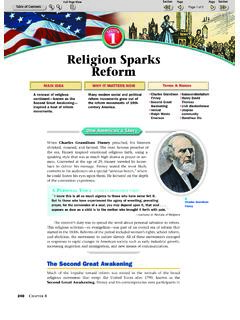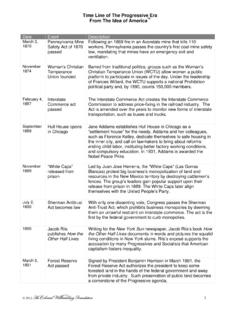Transcription of Teddy Roosevelt’s Square Deal - Caggia Social Studies
1 Terms & NamesTerms & NamesMAIN IDEAMAIN IDEA Upton Sinclair The jungle TheodoreRoosevelt Square Deal Meat InspectionAct Pure Food and Drug Act conservation NAACPAs president, TheodoreRoosevelt worked to givecitizens a Square Dealthrough progressive reforms. As part of his Square Deal,Roosevelt s conservationefforts made a permanentimpact on IT MATTERS NOWWHY IT MATTERS NOWThe Progressive Era523 When muckraking journalist Upton Sinclairbegan research fora novel in 1904, his focus was the human condition in the stock-yards of Chicago. Sinclair intended his novel to reveal thebreaking of human hearts by a system [that] exploits the labor ofmen and women for profits. What most shocked readers inSinclair s book The jungle (1906), however, was the sickeningconditions of the meatpacking industry. A PERSONALVOICEUPTON SINCLAIR There would be meat that had tumbled out on the floor, in thedirt and sawdust, where the workers had tramped and spituncounted billions of consumption [tuberculosis] germs.
2 Therewould be meat stored in great piles in rooms; .. and thousandsof rats would race about on it.. A man could run his hand overthese piles of meat and sweep off handfuls of the dried dung ofrats. These rats were nuisances, and the packers would put poi-soned bread out for them; they would die, and then rats, bread,and meat would go into the hoppers together. The JunglePresident Theodore Roosevelt,like many other readers, was nauseated bySinclair s account. The president invited the author to visit him at the WhiteHouse, where Roosevelt promised that the specific evils you point out shall, iftheir existence be proved, and if I have the power, be eradicated. A Rough-Riding PresidentTheodore Roosevelt was not supposed to be president. In 1900, the young gover-nor from New York was urged to run as McKinley s vice-president by the state spolitical bosses, who found Roosevelt impossible to control. The plot to nominateRoosevelt worked, taking him out of state office.
3 However, as vice-president,One American's StoryTeddy Roosevelt sSquare DealUpton Sinclairposes with hisson at the time of the writing ofThe jungle . p0523-531aspe-0517s3 10/17/02 8:54 AM Page 523 When thepresident spared a bear cub on ahunting expedition,a toymakermarketed apopular newproduct, the Teddy bear. Teddy Rooseveltenjoyed an activelifestyle, as this1902 stood a heartbeat away from becoming president. Indeed,President McKinley had served barely six months of his second term beforehe was assassinated, making Roosevelt the most powerful person in S RISET heodore Roosevelt was born into a wealthy NewYork family in 1858. An asthma sufferer during his childhood, young Teddydrove himself to accomplish demanding physical feats. As a teenager,he mastered marksmanship and horseback riding. At Harvard College,Roosevelt boxed and an early age, the ambitious Roosevelt became a leader in NewYork politics. After serving three terms in the New York State Assembly,he became New York City s police commissioner and then assistant secre-tary of the Navy.
4 The aspiring politician grabbed national attention,advocating war against Spain in 1898. His volunteer cavalry brigade, the RoughRiders, won public acclaim for its role in the battle at San Juan Hill in returned a hero and was soon elected governor of New York and thenlater won the MODERN PRESIDENCYWhen Roosevelt was thrust into the presidency in1901, he became the youngest president ever at 42 years old. Unlike previouspresidents, Roosevelt soon dominated the news with his many exploits. While inoffice, Roosevelt enjoyed boxing, although one of his opponents blinded him inthe left eye. On another day, he galloped 100 miles on horseback, merely to provethe feat possible. In politics, as in sports, Roosevelt acted boldly, using his personality and pop-ularity to advance his programs. His leadership and publicity campaigns helpedcreate the modern presidency, making him a model by which all future presidentswould be measured. Citing federal responsibility for the national welfare,Roosevelt thought the government should assume control whenever states provedincapable of dealing with problems.
5 He explained, It is the duty of the presidentto act upon the theory that he is the steward of the people, and .. to assume thathe has the legal right to do whatever the needs of the people demand, unless theConstitution or the laws explicitly forbid him to do it. 524p0523-531aspe-0517s3 10/17/02 8:54 AM Page 524 Roosevelt saw the presidency as a bully pulpit, from which he could influ-ence the news media and shape legislation. If big business victimized workers,then President Roosevelt would see to it that the common people received whathe called a Square term was used to describe the various progressivereforms sponsored by the Roosevelt Federal PowerRoosevelt s study of history he published the first of his 44 books at the age of24 convinced him that modern America required a powerful federal govern-ment. A simple and poor society can exist as a democracy on the basis of sheerindividualism, Roosevelt declared, but a rich and complex industrial societycannot so exist.
6 The young president soon met several challenges to his asser-tion of federal 1900, trusts legal bodies created to hold stock in manycompanies controlled about four-fifths of the industries in the United trusts, like Standard Oil, had earned poor reputations with the public by theuse of unfair business practices. Many trusts lowered their prices to drive com-petitors out of the market and then took advantage of the lack of competition tojack prices up even higher. Although Congress had passed the Sherman AntitrustAct in 1890, the act s vague language made enforcement difficult. As a result,nearly all the suits filed against the trusts under the Sherman Act were Roosevelt did not believe that all trusts were harmful, but he soughtto curb the actions of those that hurt the public interest. The president concen-trated his efforts on filing suits under the Sherman Antitrust Act. In 1902,Roosevelt made newspaper headlines as a trustbuster when he ordered the JusticeDepartment to sue the Northern Securities Company, which had established amonopoly over northwestern railroads.
7 In 1904, the Supreme Court dissolved thecompany. Although the Roosevelt administration filed 44 antitrust suits, winninga number of them and breaking up some of the trusts, it was unable to slow themerger movement in Progressive Era525 ABackgroundSee truston page R47 in AnswerRoosevelt wasan active, force-ful, and ener-getic executive;he used hisposition toshape legisla-tion and influ-ence the media. THE LION-TAMER As part of his Square Deal, President Roosevelt aggressively used the Sherman Antitrust Act of 1890 to attack big businessesengaging in unfair practices. His victor y over his first target, theNorthern Securities Company, earned him a reputation as a hard-hitting trustbuster committed to protecting the public interest. This cartoon shows Roosevelt tr ying to tame the wild lions that symbolize the great and power ful companies of 1904. SKILLBUILDERA nalyzing Political do the lions stand for? are all the lions coming out of a door labeled Wall St. ? do you think the cartoonist thinks about trustbusting?
8 Citedetails from the cartoon that support your SKILLBUILDER HANDBOOK, PAGE IDEAMAIN IDEAAS ynthesizing What actionsand characteristicsof Teddy Rooseveltcontributed to hisreputation as thefirst modernpresident?p0523-531aspe-0517s3 10/17/02 8:54 AM Page 5251902 COAL STRIKEWhen 140,000 coal miners in Pennsylvania went on strikeand demanded a 20 percent raise, a nine-hour workday, and the right to organizea union, the mine operators refused to bargain. Five months into the strike, coalreserves ran low. Roosevelt, seeing the need to intervene, called both sides to theWhite House to talk, and eventually settled the strike. Irked by the extraordinarystupidity and bad temper of the mine operators, he later confessed that only thedignity of the presidency had kept him from taking one owner by the seat of thebreeches and tossing him out of the with Roosevelt s threat to take over the mines, the opposing sides final-ly agreed to submit their differences to an arbitration commission a third partythat would work with both sides to mediate the dispute.
9 In 1903, the commissionissued its compromise settlement. The miners won a 10 percent pay hike and ashorter, nine-hour workday. With this, however, they had to give up theirdemand for a closed shop in which all workers must belong to the union andtheir right to strike during the next three Roosevelt s actions had demonstrated a new then on, when a strike threatened the public welfare, the fed-eral government was expected to intervene. In addition, Roosevelt sactions reflected the progressive belief that disputes could be settledin an orderly way with the help of experts, such as those on thearbitration REGULATIONR oosevelt s real goal was federal regulation. In 1887,Congress had passed the Interstate Commerce Act, which prohibited wealthy rail-road owners from colluding to fix high prices by dividing the business in a givenarea. The Interstate Commerce Commission (ICC) was set up to enforce the newlaw but had little power. With Roosevelt s urging, Congress passed the Elkins Actin 1903, which made it illegal for railroad officials to give, and shippers to receive,rebates for using particular railroads.
10 The act also specifiedthat railroads could not change set rates without notifyingthe public. The Hepburn Act of 1906 strictly limited the distribu-tion of free railroad passes, a common form of bribery. Italso gave the ICC power to set maximum railroad Roosevelt had to compromise with conservativesenators who opposed the act, its passage boosted the gov-ernment s power to regulate the and the EnvironmentPresident Roosevelt s enthusiasm and his considerable skillat compromise led to laws and policies that benefited bothpublic health and the environment. He wrote, We recog-nize and are bound to war against the evils of today. Theremedies are partly economic and partly spiritual, partly tobe obtained by laws, and in greater part to be obtained byindividual and associated effort. REGULATING FOODS AND DRUGSA fter reading The Jungleby Upton Sinclair, Roosevelt responded to the public s clam-or for action. He appointed a commission of experts to inves-tigate the meatpacking industry.










